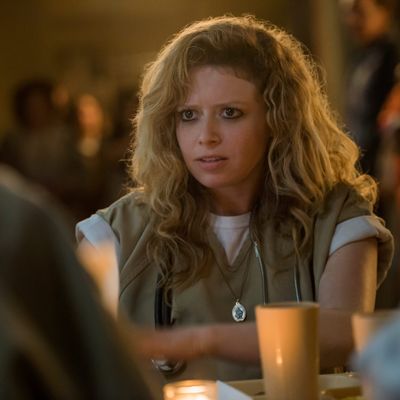
It’s tradition at this point: Every season of Orange Is the New Black has a flashback episode about a character who really doesn’t warrant a flashback episode. “Pissters!” inexplicably digs into Linda’s past as a fledgling sorority sister, a subplot only thematically connected to the rest of the episode insofar as it shows how power corrupts. In the present day, Linda is hardly a focal point of the episode, and unlike Frieda’s flashbacks in the last episode, these don’t provide a strong narrative through line. Even the humor falls flat. As the inmates of Litchfield take baby steps to organize their movement, the chaos of the prison riot runs deeper, affecting OITNB on a structural level. The inmates aren’t the only ones in need of focus; the writing of this episode is all over the place.
The one big payoff of these flashbacks (aside from bad flashback hair, which is one of my favorite television traditions) is the fact that Linda doesn’t mention “I left my sorority sister to die” when Piper and Alex ask what’s the worst thing she has ever done. Getting busted with a fake ID is, in Linda’s mind, worse than leaving an intoxicated and underdressed girl in the snow to freeze to death. Now that she’s living in the conditions of Litchfield, Linda’s perception of prison has changed, but her bottom line is still money. She notes that the uniforms don’t feel like the cotton-poly blend they’re supposed to be, and the food doesn’t look or taste at all as advertised by the suppliers. Linda’s horrified not by the dehumanizing nature of Litchfield’s conditions, but rather by the thought that MCC is being ripped off. She represents the selfish, profit-driven capitalist institutions that control and fuel the prison-industrial complex.
Warned by Pennsatucky about getting carried away in their stolen CO uniforms, Angie mistakenly replies, “Power erupts.” Her gaffe turns out to be pretty relevant. While these first few episodes have shown that power indeed corrupts, it also erupts, destabilizing Litchfield and cracking its foundation. This shift is both positive and negative, allowing the previously oppressed inmates to rise up and seize control, but also fomenting violence and exacerbating the divisions that already existed between different groups within the prison. Everyone is still cliqued up, and Alison and Ruiz lead the charge in trying to unify the movement.
When Piscatella announces that they’re ready to hear the inmates’ demands — he’d prefer to just storm the prison, but MCC forbids it on the grounds that Judy King is still inside — Ruiz and Alison set out to collect those demands from everyone. These range from the good (like reinstating the GED program) to the inane (like a zero-gravity chamber for recreation). In the end, they come up with a list of ten demands: replace all current guards with properly trained ones, reinstate the GED program, better health care, conjugal visits, amnesty for all involved in this riot provided there are no casualties, an end to arbitrary and degrading searches and use of solitary confinement, more work opportunities, no discrimination, internet access, the arrest and trial of CO Bayley for the death of Poussey Washington, and Hot Cheetos and Takis available in the commissary … along with free tampons and healthier food.
Taystee is rightfully devastated that the arrest of CO Bayley falls so low on the list of inmates’ concerns. Through Taystee, Soso, and Suzanne, OITNB reminds that this all started because of Poussey’s murder. Even though the inhumane conditions of Litchfield precede her death, that was the cataclysmic breaking point. The characters directly touched by Poussey are mourning her in different ways, speaking to the deeply personal and unfixed nature of grief. Taystee is angry and fighting for justice. Suzanne constructs a barrier around the area where Poussey was killed, deeming it a sacred space where she, Soso, and Maureen hold a vigil, their silence reverberating against the chaos of the riot. Soso seeks drugs to numb her pain, but Nicky tells her she can’t cheat grief. Soso’s indelible grief has been one of the darkest and most compelling parts of the season so far, even as it unfolds on the periphery of the riot story line. Grief is constant like that.
Because of the disjointed nature of everyone’s roles in this new Litchfield, the plot in “Pissters!” advances even more leisurely than usual. Red and Flores are piecing together some conspiracy about the initials tattooed on Piscatella. Judy King is trying to get outside, and she almost does until she’s thwarted by the Nazis and White Nationalists. Flaca and Maritza start a food fight. Nicky expresses her feelings for Morello once again, leaving Morello seemingly conflicted over her own feelings. Gloria is back in the kitchen and promises to protect Daya, who confesses that she doesn’t have the gun. The hostages are plotting their own moves, now that they also suspect the gun is gone. Coates is hiding in the ceiling, spying on Pennsatucky as she masturbates with a vibrating cell phone. (I hope the show doesn’t treat this particularly confounding story line as anything other than continued assault.) Big Boo is making moves on Linda, whom Ruiz decides she likes more than the other white girls, falling for Linda’s manipulative charms.
In other words, there’s a lot going on with this show right now, and yet very little is actually happening. OITNB has always straddled varying tones and narrative devices, making it defiantly resistant to any one genre, but the jumbled nature of this episode is just messy. It’s hard to pull off a story about chaos without coming off as, well, chaotic. It’s possible to tell several stories at once, and OITNB has certainly done so in the past, demonstrating that there is no monolithic prison narrative. But right now, the sprawling nature of the season makes watching a bit tedious. The show has gotten itself into a hole it can’t seem to get out of.

